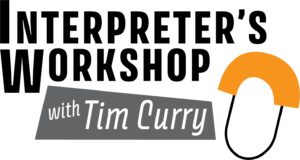Note: This was originally published in the efsli newsletter, March 2012.
Through the Eyes of a Deaf Interpreter:
Interview with Petr Vysuček
By Tim Curry, efsli Editor
Why did you start interpreting?
Around the year 2001, more and more Deaf were travelling to Prague from other countries such as Germany, for holidays. I started noticing that my mother and other Czech Deaf were having difficulty understanding these travellers. At the same time, I realized some of the people in my community had low language skills, which caused more misunderstandings.
Why are Deaf interpreters needed?
Deaf interpreters (DI) already completely understand the Deaf consumers’ life-perspective of culture, discrimination, language, and so on. Hearing interpreters (HI) can never fully comprehend this perspective. Three examples come to mind. Deaf culture can be quite straightforward. In a courtroom, the protocol is very strict as far as turn taking in communication. I sometimes need to quickly explain that to certain clients, where a HI may be too shy to intervene. Sometimes a doctor will use quite a high level of terminology but many HIs cannot interpret it properly for a low-language client. Similarly, abstract visual images that a Deaf client may have when speaking with a psychologist, are also easier for a DI to interpret properly.
How is the interpreting process different for a DI than for an HI?
DIs are usually working in their first language into another level of that language, so, we understand the meaning and the goals quicker from the signing client. We also have the ability to adapt more easily when the client does not understand.
What problems do you have interpreting?
Trusting my hearing team to be qualified. Many times, they are mumbling and I cannot detect the words or see if they are confident in what they are saying. I constantly need to explain classifiers, signs, or expressions. I feel I am doing twice the work by processing what the client expresses AND helping/teaching my team at the same time. DIs need to be assured that their hearing team is qualified in the languages as well as professional enough to say if they are not understanding.
Do you always work with a hearing team or are there times when you interpret alone?
I do both. For common situations such as normal bank transactions or regular doctor checkups, I can be alone and use paper and pen. If it is a more complicated situation, like court or a conference, I work with a HI.
Can any Deaf person interpret?
Not just anyone can interpret. If a Deaf has no university experience, they do not interpret well in situations that use a higher vocabulary. The important thing is an in-depth understanding of the languages, diverse situations, and a universal knowledge base.
What is the influence of the Deaf community on interpreting?
My opinion is that the interpreting community tends to act alone. That is bad. The older Deaf tend not to like conflict. However, proud Deaf should stand up and cause the interpreters to listen and adapt to the needs and wants of the Deaf.
What are the ethical and professional issues you encounter by being both a part of the Deaf community and the interpreting community?
It is hard. When I interpret, I must try not to influence the situation with my knowledge or advice. Many Deaf in the community have gotten upset with me because I would not help them decide. At times, though, I have had to “teach” Deaf, situational protocols. It is a fine-line.
Is there something else you would like to tell the members of efsli about being a DI?
Many times, HIs are anxious about working with a us. They think I will catch all of their mistakes and criticize them. Please remember that in this situation we are equals. If you have the chance to work with a DI, you will gain a wealth of experience. You will learn new ways of signing ideas and possibly new vocabulary. The client will have a better chance to have 100% satisfaction. THAT is our goal…working together for the client!
Petr Vysuček a Deaf linguist, graduated with a degree of Czech in Communication with the Deaf at Charles University in Prague. He is an interpreter specializing in IS, legal settings and for low-language mediation. He is the founder and chairman of both Pevnost – Czech Center for Sign Language, o.s. (www.pevnost.com) and Institute of the Deaf for Specialized Education, o.s. (www.inpsv.com). Petr is also a board member of Queer Deaf Czech (www.queerdeaf.cz), and a member of the Expert Committee on Interpreting (www.asnep.cz). [NOTE: This short bio is old. Petr now has a PhD, has many more accolades and experience.]
